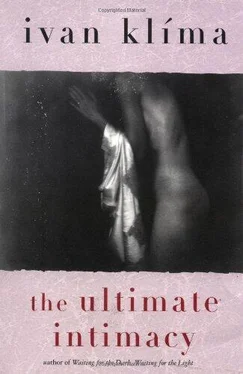Ivan Klima - The Ultimate Intimacy
Здесь есть возможность читать онлайн «Ivan Klima - The Ultimate Intimacy» весь текст электронной книги совершенно бесплатно (целиком полную версию без сокращений). В некоторых случаях можно слушать аудио, скачать через торрент в формате fb2 и присутствует краткое содержание. Год выпуска: 1998, Издательство: Grove Press, Жанр: Современная проза, на английском языке. Описание произведения, (предисловие) а так же отзывы посетителей доступны на портале библиотеки ЛибКат.
- Название:The Ultimate Intimacy
- Автор:
- Издательство:Grove Press
- Жанр:
- Год:1998
- ISBN:нет данных
- Рейтинг книги:3 / 5. Голосов: 1
-
Избранное:Добавить в избранное
- Отзывы:
-
Ваша оценка:
- 60
- 1
- 2
- 3
- 4
- 5
The Ultimate Intimacy: краткое содержание, описание и аннотация
Предлагаем к чтению аннотацию, описание, краткое содержание или предисловие (зависит от того, что написал сам автор книги «The Ultimate Intimacy»). Если вы не нашли необходимую информацию о книге — напишите в комментариях, мы постараемся отыскать её.
The Ultimate Intimacy — читать онлайн бесплатно полную книгу (весь текст) целиком
Ниже представлен текст книги, разбитый по страницам. Система сохранения места последней прочитанной страницы, позволяет с удобством читать онлайн бесплатно книгу «The Ultimate Intimacy», без необходимости каждый раз заново искать на чём Вы остановились. Поставьте закладку, и сможете в любой момент перейти на страницу, на которой закончили чтение.
Интервал:
Закладка:
'When?'
'Couldn't tell you.'
'I think I can work it out.'
'I just thought it'd be better if you phoned, they'd just tell me to f—'
He wouldn't get to bed now. The lad wouldn't care about his back pain; he was waiting for him to do something. After all he'd preached to him about loving one's neighbour and the boy was now doing just that. He was showing concern even though he didn't have to.
He sent him to get changed while he limped off to get a painkiller.
They parked in front of the surgical block.
'What are you doing here?' Hana was always pleased when he dropped by unexpectedly. Then she led them to the ward where the injured fellow lay. Alois pulled a chair over to the bed and started to tell him something, more with gestures than words.
He looked at the foreigner whose father must have been one of those he had vainly told to go home twenty-six years before. It was better to come as a labourer than as a soldier; on the other hand the soldier had returned unscathed, whereas this lad lay here pale, covered in bandages, his lips drawn back with the pain, his blond hair soaked in sweat.
Was our fathers' iniquity truly visited on us after all? It certainly was a fact that here on earth we bore the consequences of their actions.
The orthopaedist that Hana took him to see, and that she had
talked to Daniel about previously, asked: 'Do you have some connection with the labourer, Reverend?'
'No. A lad in our congregation is a workmate of his. I promised I'd enquire how he was,' Daniel said. 'Apparently he wasn't insured; does that complicate things for you?'
'Most definitely. I've just had the scoundrel he works for here. He was in a bit of a panic and so he offered to make a contribution but when he heard what an operation would cost he backed down. He'd sooner pay him the plane fare back to Kiev where he came from.'
'So you won't be operating?'
'It would be a fairly complicated operation.'
'And costly?'
'With the post-operative care, Reverend, about a quarter of a million. That's all. Because in this country a doctor still gets paid less than a bricklayer. The Germans would charge you at least three times that.'
'So you don't intend to operate on him?'
'We can't afford to, Reverend. The fellow who hired him as slave-labour should be locked up. But in this country they spend time badgering doctors to keep their costs down while villains like him do what they like. OK, let him pay the air fare, at least. In a couple of days he could be in a hospital in Kiev.'
And can the operation be put off?'
'That's not the point; we've pinned his leg for the time being. It's more a question of what they'll do to him there. Have you any idea what medical care is like over there? Do you think they care whether or not he'll be a cripple for the rest of his days? They'll straighten it up a bit and slap it in plaster. And even then he'll be lucky.'
And here you would operate on him so he could walk normally afterwards?'
'We'd do the maximum.'
And what if someone were to pay for the operation?'
'I doubt that anyone would.'
'What if I were to pay for it, for instance?'
The doctor stared at him in amazement. 'Why would you do that for someone you don't even know?'
'You also help people you don't know.'
'But that's my job, Reverend. All right, I know what you're going to say: it's your job too. But just let me tell you something. Not long ago we had a fellow in here, about your age, with gangrene in his leg.
Abroad they have a drug to treat it that we don't have yet. It's expensive. About three thousand marks a shot. And you have to have a repeat dose every year. Here there are only two options. Amputation or death. That fellow didn't want to believe it and begged me to save his leg. So I told him about that drug and that he'd have to obtain it himself, and fast. He agreed. Then I told him the price and he burst into tears. He could never find that much.'
'So you amputated the leg?'
'There was no other way; he'd have died before he'd managed to get that amount of money together. The only reason I'm telling you this, Reverend, is so you understand that trying to play the good Samaritan in our business would break a Rothschild.'
The doctor was right, of course. It would take no more than a couple of minutes to give away all the money he had received out of the blue. It was enough to take a look round. People were suffering all over the world, all around them. All the same he said: 'I believe the right thing to do is for you to operate on him here, if you'll agree.'
'We always prefer to fix people up rather than kick them out somewhere else.' He added, 'I can't take it from you. Some of it maybe. We'll have to find the rest from somewhere.'
'We'll agree on the details later, but I wouldn't like anyone to know about it. Not even the lad concerned.'
The doctor shrugged. 'That will be no problem. No one would believe it anyway.'
6
Samuel
The architect Samuel Musil regarded himself as a capable and decent man, a good husband and even a good father to the children of his three marriages — or the last two, at least. The majority of people in his field had no doubts about his qualities as a professional, even though a number of his opponents branded his most famous and prestigious projects as crimes perpetrated on the capital. Lately, people had been blaming him for the skilful way he had operated under the old regime, but few had said so to his face and he was convinced that he had
behaved no worse than most people would have done in his position and that he had never produced anything that was in any way at odds with his 'professional or human conscience' — or so he had claimed in a newspaper interview.
He had spent most of his life under the Communist regime. He used to start the biographical appendix to his personnel form with the sentence: 'I was born into the family of a poor peasant factory worker towards the end of the great economic crisis; after the war I joined the Union of Czech Youth and always sympathized with the policy of the Communist Party.' Admittedly, that sentence, covering the first eighteen years of his life, was not untrue, but in an interview with a newspaper on the occasion of his fifty-fifth birthday he did not repeat a single detail of it, but instead he recalled his years as a boy scout and the fact that his family never joined a co-operative and that his uncle was wounded in the battles on the Western Front. Fortunately, when he was setting up a practice after the fall of the old regime, nobody investigated either his origins or his convictions. All that was required was money, and it really didn't matter where it came from.
Samuel had no brothers or sisters. His mother had a tendency to depression and excessive mistrust, and even one child was an inordinate burden for her. There were days when she refused to speak to him, let alone caress or cuddle him. His father spent little time at home. He used to spend a lot of time at work and found little to entice him home; even in his looks, his son resembled too closely the wife who had embittered his life.
Samuel's schools had been terrible; he started primary school under the Protectorate and attended grammar school during the Stalinist years.
He graduated from university several years after Stalin's death, but even at that time the Kreshchatik in Kiev or the Lomonosov University in the Lenin Hills in Moscow were still regarded as notable achievements of progressive architecture. When he looked at them, however, the only thing that struck him was their bumptious ugliness. He wrote his thesis on the pre-war Soviet avant-garde. He emphasized the principles of the post-revolutionary Association of New Architects who had called for large unadorned surfaces and the construction of abstract geometric forms. These requirements, he maintained, had been the inspiration for Le Corbusier's purism.
Читать дальшеИнтервал:
Закладка:
Похожие книги на «The Ultimate Intimacy»
Представляем Вашему вниманию похожие книги на «The Ultimate Intimacy» списком для выбора. Мы отобрали схожую по названию и смыслу литературу в надежде предоставить читателям больше вариантов отыскать новые, интересные, ещё непрочитанные произведения.
Обсуждение, отзывы о книге «The Ultimate Intimacy» и просто собственные мнения читателей. Оставьте ваши комментарии, напишите, что Вы думаете о произведении, его смысле или главных героях. Укажите что конкретно понравилось, а что нет, и почему Вы так считаете.






![Theresa Cheung - The Dream Dictionary from A to Z [Revised edition] - The Ultimate A–Z to Interpret the Secrets of Your Dreams](/books/692092/theresa-cheung-the-dream-dictionary-from-a-to-z-r-thumb.webp)





